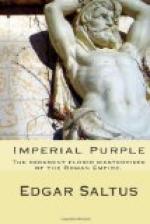The museum became a mad-house. Hadrian was ill; tired in mind and body, smitten with imperialia. It was then the young Verus died, leaving for a wonder a child behind, and more wonderful still, Antonin was adopted. Through Rome, meanwhile, terror stalked. Hadrian, in search of a remedy against his increasing confusion of mind, his visible weakness of body, turned from physicians to oracles; from them to magic, and then to blood. He decimated the senate. Soldiers, freemen, citizens, anybody and everybody were ordered off to death. He tried to kill himself and failed; he tried again, wondering, no doubt, why he who commanded death for others could not command it for himself. Presently he succeeded, and Antonin—the pious Antonin, as the senate called him— marshalled from cellars and crypts the senators and citizens whom Hadrian had ordered to be destroyed.
VIII
FAUSTINE
Anyone who has loitered a moment among the statues in the Salle des Antonins at the Louvre will recall the bust of the Empress Faustina. It stands near the entrance, coercing the idler to remove his hat; to stop a moment, to gaze and dream. The face differs from that which Mr. Swinburne has described. In the poise of the head, in the expression of the lips, particularly in the features which, save the low brow, are not of the Roman type, there is a commingling of just that loveliness and melancholy which must have come to Psyche when she lost her god. In the corners of the mouth, in the droop of the eyelids, in the moulding of the chin, you may see that rarity—beauty and intellect in one —and with it the heightening shadow of an eternal regret. Before her Marcus Aurelius, her husband, stands, decked with the purple, with all the splendor of the imperator, his beard in overlapping curls, his questioning eyes dilated. Beyond is her daughter, Lucille, less fair than the mother, a healthy girl of the dairymaid type. Near by is the son, Commodus. Across the hall is Lucius Verus, the husband of Lucille; in a corner, Antonin, Faustine’s father, and, more remotely, his wife. Together they form quite a family group, and to the average tourist they must seem a thoroughly respectable lot. Antonin certainly was respectable. He was the first emperor who declined to be a brute. Referring to his wife he said that he would rather be with her in a desert than without her in a palace; the speech, parenthetically, of a man who, though he could have cited that little Greek princess, Nausicaa, as a precedent, was too well-bred to permit so much as a fringe of his household linen to flutter in public. Besides, at his hours, he was a poet, and it is said that if a poet tell a lie twice he will believe it. Antonin so often declared his wife to be a charming person that in the end no doubt he thought so. She was not charming, however, or if she were, her charm was not that of exclusiveness.




